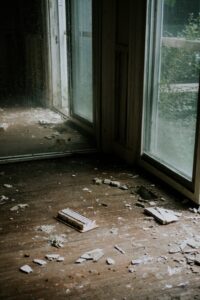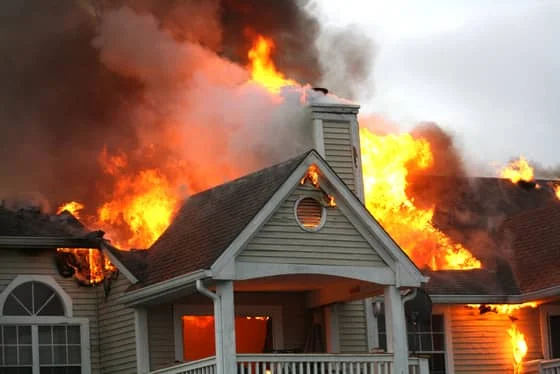One of homeowners’ biggest concerns following a house fire is the smoke residue that can linger in a home and be breathed in by occupants. These invisible smoke particles can severely damage a person’s health.
In this article, we are going to take a look at what can be done about smoke residue after a house fire.
First, When Do Most House Fires
Occur & What Causes Them?
House fires can occur at any time, but statistics show that most house fires occur between the hours of 6:00 pm and 10:00 pm. This is because people are usually cooking dinner, using heating appliances, and engaging in other activities during this time that may cause fires. But it’s important to note that fires can happen at any time, so it’s crucial to always practice fire safety measures and have working smoke detectors in your home.
The main cause of house fires is a cooking accident. According to the National Fire Protection Association (NFPA), cooking equipment is involved in almost half of all reported home fires and is the leading cause of home fire injuries.
Other common causes of house fires include:
Heating equipment:
Heating equipment such as space heaters and furnaces can cause fires if not used properly.
Electrical malfunction:
Faulty wiring, overloaded outlets, and electrical equipment malfunctions can cause fires.
Smoking:
Smoking materials such as cigarettes, pipes, and cigars can ignite flammable materials and cause fires.
Candles:
Candles can easily tip over or ignite flammable materials and cause fires.
Children:
Children playing with matches or lighters can accidentally start fires.
Arson:
Intentionally set fires can cause significant damage and loss of life.
Dealing with Hidden Damage
from a House Fire
A house fire can cause a lot of damage that is not readily visible to the human eye, including smoke damage. During a house fire, smoke and soot can penetrate walls and other materials, leaving behind a residue that can be difficult to clean.
The residue can also cause unpleasant odors to linger in the home. House fires cause other types of damage as well.

For example, heat from a fire can cause structural damage to the home’s foundation, walls, and ceilings, which also may not be visible to the naked eye.
Furthermore, even after the fire is extinguished, water damage can occur from the efforts to put out the flames. Water from sprinkler systems or firefighting efforts can seep into walls and floors, causing damage to electrical systems, plumbing, and other materials.
However, one of the most dangerous types of damage left behind by a house fire is smoke damage.
Breathing in Smoke Residue After a House Fire
Can be Very Dangerous
In fact, it can cause a range of health problems. That’s because smoke residue contains toxic particles and chemicals that can be harmful to the respiratory system and other organs in the body.
Some of the dangers of breathing in smoke residue include:
Respiratory problems:
Smoke residue can cause irritation and inflammation of the airways, which can lead to breathing difficulties, coughing, and wheezing. Prolonged exposure to smoke residue can also lead to chronic bronchitis and asthma.
Skin irritation:
Smoke residue can irritate the skin, causing rashes and itching.
Eye irritation:
Smoke residue can cause irritation and redness in the eyes.
Headaches:
Exposure to smoke residue can cause headaches and dizziness.
Carbon monoxide poisoning:
Smoke residue can also contain carbon monoxide, a poisonous gas that can cause headaches, nausea, dizziness, and even death in high concentrations.
It’s important to seek medical attention if you experience any symptoms after exposure to smoke residue and to have your home professionally cleaned and ventilated to remove any remaining smoke particles and odors.
The Best Way to Clean Up Smoke
Residue After a House Fire
The best way to clean up smoke residue after a house fire is to hire a professional fire restoration company. This process is especially crucial when selling your fire-damaged house and a thorough inspection and clean up are required.
They have the knowledge, experience, and equipment necessary to safely and effectively clean up the residue and restore your home to its pre-fire condition.
If you choose to clean up the residue yourself, here are some tips to keep in mind:
Wear protective gear:
It’s important to wear gloves, eye protection, and a respirator mask to avoid inhaling or coming into contact with the toxic particles in the smoke residue.
Open windows and use fans:
Ventilate the area by opening windows and using fans to help remove the smoke residue.
Clean surfaces:
Use a dry chemical sponge or a vacuum with a HEPA filter to clean surfaces. Avoid using water or liquid cleaning products, as this can spread the smoke residue and make it harder to clean.
Clean fabrics:
Launder all fabrics, including clothing, bedding, curtains, and upholstery, using a heavy-duty detergent and a cup of white vinegar to help neutralize odors.
Replace air filters:
Replace the air filters in your HVAC system to remove any remaining smoke particles from the air.
More Tips for Cleaning Up Smoke Residue
After a House Fire
Before restoring the property or selling your fire-damaged house, here additional tips for cleaning up smoke residue:
Clean walls and ceilings:
Use a mixture of warm water and trisodium phosphate (TSP) to clean walls and ceilings. TSP is a powerful cleaning agent that can help remove soot and smoke residue.
Clean hard surfaces:
Use a mixture of warm water and white vinegar to clean hard surfaces such as countertops and floors. Vinegar can help neutralize odors and remove smoke residue.
Clean carpets and rugs:
Use a steam cleaner to clean carpets and rugs thoroughly. For best results, use a cleaning solution designed for smoke damage.
Clean electronics:
Smoke residue can damage electronics, so it’s important to clean them thoroughly. Use compressed air to blow out any smoke particles and wipe down the surfaces with a dry cloth.
Dispose of contaminated items:
Any items that cannot be cleaned, such as food, medicine, and cosmetics, should be disposed of properly. Check with your local health department for guidance on how to dispose of these items safely.
Remember to always wear protective gear, such as gloves and a respirator mask, when cleaning up smoke residue, and ventilate the area as much as possible to avoid inhaling toxic particles.
It’s also important to note that even with the cleaning measures outlined above, smoke residue can be difficult to remove completely. Hiring a professional fire restoration company is the best way to ensure that the cleanup is thorough and safe.
Can You Ever be 100% Sure Smoke Residue Has Been
Totally Cleaned Up After a House Fire?
It can be difficult to be 100% sure that smoke residue has been totally cleaned up after a house fire, as the particles can be very small and may be difficult to detect.
However, with proper cleaning and restoration techniques, the majority of the smoke residue can be removed.
Professional fire restoration companies use specialized equipment, such as air scrubbers and thermal foggers, to thoroughly clean and deodorize the affected areas. They also use specialized cleaning agents that are designed to break down and remove smoke residue.
In addition, professional restoration companies will perform a thorough inspection of the home to ensure that all areas have been cleaned and restored. They will also perform air quality testing to ensure that the air in the home is safe to breathe.
Gain Peace of Mind by Selling Your House
to We Buy Fire Damaged Houses
Instead of worrying about breathing in smoke residue after a house fire, you can sell your burned home to We Buy Fire Damaged Houses in as-is condition. Then you can use the money to buy a new house where you don’t have to worry about smoke residue. Fill out the form below to learn more.
Photo by Amber Kipp on Unsplash

